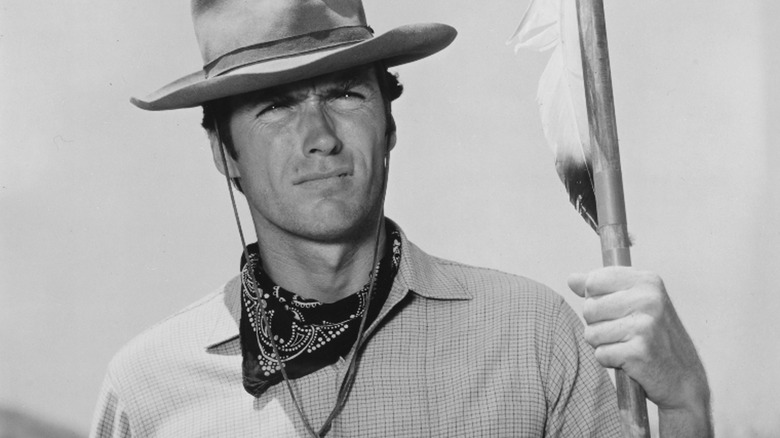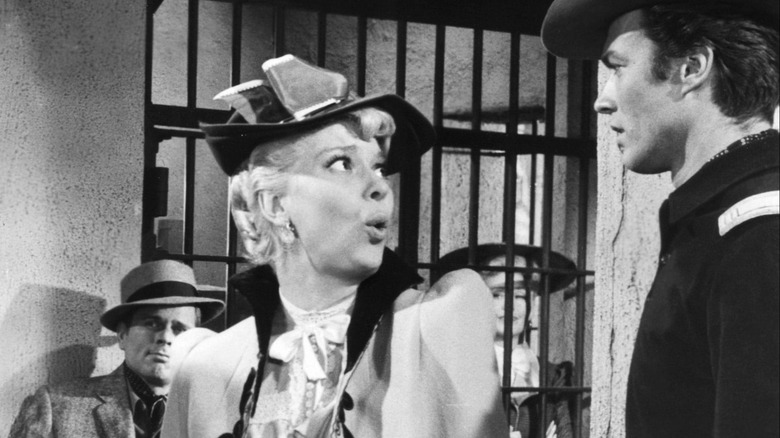Clint Eastwood Got His Big Break In A Forgotten 1956 Western Comedy
Getting your first big break in Hollywood can be tricky; the journey to superstardom relies as much upon luck and the correct combination of circumstances as it does innate talent. Even someone like Clint Eastwood — whose impressively prolific career spans several decades and has molded him into a cultural icon — struggled to make a mark when he first set out to act. When Eastwood auditioned for the first time, he was rejected — a likely occurrence for even the biggest stars today, as the perfect opportunities often boil down to the right connections and a performance suited to the role. After Eastwood dealt with a string of unsuccessful auditions in 1954, he scored a minor, uncredited role in Jack Arnold's "Revenge of the Creature," and went on to star in similar parts that mostly amounted to brief appearances with little to no dialogue.
In an attempt to diversify his career, Eastwood dabbled in television roles in 1955, and this led to him being cast as Rowdy Yates in the CBS Western series "Rawhide." This would only be a glimpse into Eastwood's ability to embody charismatic leading men within this genre, but the actor was rather unsatisfied with the scope of this role, as the nature of the character felt ill-suited to his instinctual artistic tendencies. Nevertheless, it was "Rawhide" that helped him make waves in the industry, as the show ran on CBS for quite some time and was well-liked during the period it aired. However, the series fell prey to arbitrary network television rating systems and its own dwindling inspirations, which led to its mid-season cancellation.
During this time of crisis, Eastwood landed his breakthrough role in a Western comedy — "The First Traveling Saleslady" — where he played Lt. Rice, a supporting character that became his first (relatively) significant part in a feature film.
Clint Eastwood's breakout Western comedy isn't very memorable
Apart from Eastwood, James Arness, best known for playing Marshal Matt Dillon in the "Gunsmoke" franchise, also played his first supporting role in "The First Traveling Saleslady," which was helmed by Arthur Lubin (who directed 1943's "Phantom of the Opera"). Unfortunately, the film was a box office bomb that drove distribution company RKO Radio Pictures into shutting down, as its continued survival desperately hinged upon a blockbuster hit that would help actualize other projects in development. Sadly, this did not come to pass.
In terms of plot, "The First Traveling Saleslady" follows businesswoman and suffragette Rose Gilray (Ginger Rogers), whose wagon collides with an automobile, which is posited as the transportation medium of the future. Shortly after this incident, Rose pioneers a bold artistic concept to bolster sales for the corset business, but the endeavor is shut down by the police, which facilitates a meeting with rancher Joel Kingdon (Arness), who hinders her attempts to sell barbed wire (a side hustle she takes up to pay back the money she owes to a businessman). The rest of the plot isn't remotely interesting, and the small role that Eastwood has is more blink-and-you-miss-it than one would like it to be.
After starring in Lubin's film, Eastwood appeared in a string of small roles in both film and television, and things seemed bleak for a while, especially after the sudden cancellation of "Rawhide." Then, in late 1963, Sergio Leone, who was not a mainstream name in Hollywood at the time, put forth the idea of an Italian-made Western called "A Fistful of Dollars," which would not only kickstart Eastwood's career path to superstardom, but it also altered the trajectory of the spaghetti Western genre, and how it would be perceived from then on. The success of this endeavor also went on to birth the seminal "Dollars Trilogy," with Eastwood cementing his worth as a leading man capable of playing both charismatic heroes and intriguing antiheroes, along with everything in between. The rest is history.

